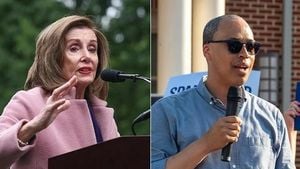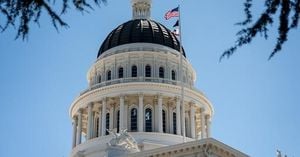Tempers flared in the Scottish Parliament this week as the debate over illegal immigration and Scotland’s housing crisis reached a boiling point, with deep divisions emerging between the Scottish Conservatives, the SNP, and the Scottish Greens. In a session marked by heated exchanges and impassioned speeches, Scottish Tory leader Russell Findlay threw his weight behind his party’s plan to withdraw the UK from the European Convention on Human Rights (ECHR), arguing that such a move is the only credible way to regain control over the country’s borders and address what he described as “unsustainable” levels of illegal immigration.
According to DonegalLive.ie, Findlay told MSPs at Holyrood, “Illegal immigration is causing strain in our local communities and on our nation’s finances. That is why I endorse Kemi Badenoch’s plan to withdraw from the ECHR and to deport those who do come here illegally. This is the only credible way we can again take control of our borders.” This endorsement followed a high-profile announcement by Kemi Badenoch at the Conservative conference in Manchester, where she pledged that, if returned to power, the Conservatives would pull the UK out of the ECHR and aim to deport 150,000 people a year.
The Tories’ motion, which focused on the impact of illegal migration on housing in Scotland, reignited a contentious debate that has been simmering for months. The Scottish Daily Express reported that the Scottish Tories called on the Scottish Government to reinstate local connection rules for social housing. These rules, scrapped by the SNP in 2022, previously required that those declaring themselves homeless must have lived, worked, or had family ties in the council area where they sought social housing. The abolition of these rules, Findlay and his colleagues argue, has contributed to a surge in asylum seekers in cities like Glasgow, exacerbating accommodation shortages and straining public resources.
Findlay painted a stark picture of Glasgow’s predicament, describing it as “a city that declared a housing emergency two years ago — a city with a mountain of debt standing at £1.6 billion and rising.” He continued, “Little wonder the council leader, Susan Aitken, has suggested a pause on asylum seeker dispersals to Glasgow, while her SNP colleague concedes the existing system risks damaging social cohesion.” According to Findlay, Glasgow now houses more asylum seekers than any other local authority in the United Kingdom, and the council is facing a massive £60 million budget shortfall as a result.
The debate quickly turned acrimonious, with accusations of racism and intolerance flying across the chamber. Housing Secretary Mairi McAllan, representing the SNP, fiercely criticized the Conservative position, dismissing it as “right-wing nonsense finding itself in our national Parliament.” She warned that withdrawing from the ECHR would leave the UK isolated, “alongside Russia and Belarus as the only ones not a signatory.” McAllan stressed the importance of the ECHR, saying, “The ECHR promotes the rule of law, the protection of individuals, it represents the difference between barbarity and civilisation. It says you have rights by virtue of being human and human alone, and we should be suspicious of anyone who tries to drag us from it.”
McAllan also took aim at what she described as the normalization of prejudice and fear, stating, “To this right-wing nonsense finding itself in our national Parliament for the second time in a month, to mistruths on social media read by thousands before we have the chance to correct them, to politicians, journalists and institutions repeating and thereby normalising unfounded suspicion, fear and hatred that should never be normalised. We will call it what it is. It is prejudice, it is intolerance, it is racism, it is all of these things because it has no basis whatsoever in fact. Conflating crime with migration, as the Conservatives do in this Chamber, is simply not factual. Holding whole populations to account for the criminal actions of one individual is patently absurd.”
Scottish Greens MSP Maggie Chapman joined McAllan in condemning the Tories’ approach, arguing that “there is no such thing as an illegal human being.” Chapman urged fellow MSPs to reject the motion, warning, “MSPs must refuse to be dragged into the gutter of xenophobia.”
Despite the fierce pushback, Findlay remained adamant that concerns about immigration are not rooted in racism or extremism, but reflect the mainstream views of ordinary Scots. “It is also not racist to recognise that our country has failed in its fundamental duty to control its borders. Too many have come here illegally or have overstayed their welcomes, and too many are here not to give but to take. And too many do not share or even actively oppose our country’s values. It is also not racist to say that we should remove foreign killers, paedophiles and rapists from our country. And it should not need saying, but it is not racist to say that countless women have been trafficked and enslaved into prostitution by evil criminal gangs. It is not racist to want to stop the boats. It is a treacherous trade that claims lives and enriches gangsters.”
The debate has not been limited to parliamentary chambers. Polling cited by the Scottish Daily Express shows that more Scots than ever before are worried about the impact of illegal immigration, with growing unrest across the country as hundreds of asylum seekers are housed in taxpayer-funded hotels. Findlay contended that “uncontrolled illegal immigration is unsustainable, with growing concerns across Scotland. Yet the left-wing political class at Holyrood still don’t want to have this debate. By attacking us for bringing this to parliament, they confirm how out of touch they are with the views of mainstream Scotland.”
Meanwhile, SNP Housing Secretary McAllan maintained her stance that “people are not illegal, seeking asylum is a right,” and emphasized the need to treat all individuals with dignity and respect. She reminded her colleagues, “We are talking about people, people with hopes, people with aspirations, people who have suffered,” and insisted that they are “human beings who should be treated with dignity and respect.”
At the heart of the dispute lies a fundamental clash of values and priorities. For the Conservatives, the issue is one of border control, fiscal responsibility, and social cohesion. For the SNP and Scottish Greens, it is about upholding human rights, compassion, and Scotland’s international reputation. The debate over whether to reinstate local connection rules, withdraw from the ECHR, or overhaul asylum policies has become a proxy for broader questions about national identity, sovereignty, and the role of government in a rapidly changing world.
With Glasgow’s housing crisis worsening and the UK’s immigration policies under intense scrutiny, the outcome of this debate will have far-reaching implications for Scotland’s future. As the political battle lines harden, ordinary Scots are left to grapple with the practical realities of a system under strain, even as their leaders argue over the best path forward.
The clash in Holyrood this week made one thing clear: the conversation around immigration, housing, and human rights in Scotland is far from settled, and both sides are digging in for a long and bitter fight.




